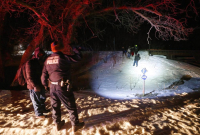Support strong Canadian climate journalism for 2025
Teams of Canadian soldiers stretched canvas across the metal frames of tents at a camp site near the Quebec−U.S. border Wednesday as they helped fellow authorities cope with the crush of asylum seekers crossing into Canada.
The site, located on a flat stretch of grass behind the building where asylum claimants are bused in from the border, was expected to accommodate up to 500 people.
"We have about 100 personnel here on the ground who will set up 25 tents in order to house approximately 500 people," Maj. Yves Desbiens said in an interview in Saint−Bernard−de−Lacolle. "We’re going to set up lighting as well, and heating and we’re going to have flooring installed."
The soldiers will have no role in security matters and will not participate in law−enforcement tasks. All but a few will return to their home base once the site is completed.
Canada Border Services Agency spokeswoman Judith Gadbois−St−Cyr said the camp was being set up because too many people were crossing the border for them to be processed immediately.
In a phone interview, she said it can currently take two or three days to process a refugee claim and most people would not stay in the camp longer than that.
She said border services would be responsible for providing food, water, beds and blankets. By 5:30 p.m., the tents had been erected and strung with hanging lights as soldiers continued to lay down wooden flooring.
Gadbois−St−Cyr said the camp would be ready to accept people "in a short time" but could not say exactly when that would be.
Earlier in the day, in nearby Hemmingford, some 40 asylum seekers sat under white tents at an impromptu reception centre that has sprung up on the Canadian side of a popular illegal border crossing.
The atmosphere appeared relaxed as border crossers lined up for lunch boxes handed out by RCMP personnel and waited to be shepherded onto buses for the 10−minute drive to the Lacolle processing station.
"I’ll be your tour guide," one RCMP officer inside the bus could be heard joking. "There’s the United States; this is Canada."
Many of the hundreds of people who are crossing the Canada−United States border into Quebec to seek asylum are of Haitian descent. Robert Duteau, the mayor of Saint−Bernard−de−Lacolle, told The Canadian Press he is not worried about overcrowding.
"There is space to receive them (the soldiers)," he said. "I know there’s a lot of action in that area, but, all things considered, it doesn’t upset me."
In the United States, the Trump administration is considering ending a program that granted Haitians so−called "temporary protected status’’ following the massive earthquake that struck Haiti in 2010.
Many of the arrivals are being housed in Montreal at the Olympic Stadium.
The City of Montreal said recently between 250 and 300 people were crossing the Canada−United States border to seek asylum every day, up from 50 per day in the first half of July.
On Wednesday, the Quebec government announced the opening of another facility, this one at the former Royal Victoria Hospital with a capacity of between 300 and 320 places. Another shelter was opened earlier this week at a former convent that is owned by the city.
Francine Dupuis, who oversees a Quebec government−funded program that helps asylum seekers, said 2,620 people are currently being housed in temporary accommodation in Montreal.
"As soon as people arrive (in Montreal), not only do we find them a place to stay but we make sure it’s safe, that they have the meals they need and that it’s hygienic," Dupuis said. "We try to keep families together."
— With files from Jean Philippe Angers in Montreal





Comments